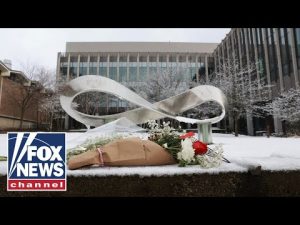**Pandemic Revelations: A Call for Transparency and Accountability Amidst Chaos**
In the echoes of an ongoing pandemic that turned the world upside-down, a significant revelation is surfacing, and it has many individuals holding on to their hats. Congressman Brad Wenstrup, a Republican from Ohio and chairman of the Select Subcommittee on the Coronavirus Pandemic, recently dropped some major hints about the origins and implications of COVID-19. For those who thought they had heard it all, the news that the virus allegedly came from a lab in Wuhan is rattling the proverbial cage. As frustrations mount, it’s becoming increasingly clear that there’s a lot more going on behind the scenes.
The nature of government transparency—or lack thereof—has stirred a hornet’s nest. Congressman Wenstrup mentioned that what has come to light is merely the tip of the iceberg. Declassified documents have already left many aghast, but the classified information is said to be even more shocking. His comments raise concerns about a well-orchestrated cover-up involving high-ranking officials, large pharmaceutical companies, and federal agencies. The idea that information has been deleted or buried adds fuel to the fire, leading to questions that demand answers.
Digging deeper into these revelations, it seems there’s a tangled web of interests spanning various corporations and political factions. As more information becomes declassified, Americans find themselves eager for transparency, especially considering the mounting evidence suggesting that trusted institutions may not have their best interests at heart. This echoes sentiments voiced by figures like Robert F. Kennedy, who has openly expressed distrust in government agencies and has called for the release of pertinent information, particularly related to the pandemic. If more public figures join him in this call for transparency, it may generate the momentum needed for real change.
The discussion also touches upon concerns about growing corruption and inefficiency within the government. Many citizens are frustrated by a sense of betrayal as countless initiatives aimed at better public health now appear riddled with deception. Deleting records, sharing sensitive information unlawfully, and stifling inquiries into possible misconduct indicate a government that’s perhaps lost sight of its fundamental duty to the public. These problems are not taking place in a vacuum; as Congressman Wenstrup noted, they involve a massive network of players that spans across political lines.
As the potential for global conflict looms on the horizon, the stakes are higher than ever. Nations like South Korea, Taiwan, and China are caught up in a regional tug-of-war that heightens the urgency of national readiness. Amid these concerns, accountability appears more crucial than ever. If the ongoing pandemic has taught us anything, it’s that information—and a lot of it—can mean the difference between safety and chaos. A push for declassification promises not just transparency but also greater accountability across the board, echoing the wishes of the Founding Fathers who believed in a government that truly serves the people.
In conclusion, the circumstances surrounding the COVID-19 pandemic are a reminder that the fight for truth is ongoing. With key figures advocating for transparency, the appetite for accountability is palpable. Citizens are urged to remain vigilant as more information is expected to unfold, shaking the foundations of both trust and governance. The revelations pouring in may feel daunting, but they also present a unique opportunity to reshape the relationship between the government and the governed. One can only hope that this journey leads to a brighter, more accountable future, and—as history has shown—an awareness of the past is crucial for ensuring a responsible path forward.







